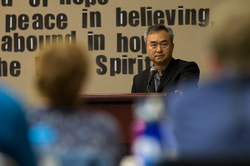The Presbyterian Church (U.S.A.) would have fewer, bigger synods under a proposal presented Sunday to commissioners at the 221st General Assembly (2014).
Byron Wade and Ariel Mink, co-chairs of a second commission appointed to study mid councils, walked commissioners through six recommendations, which include
- reconfiguring synod boundaries through a collaborative process between synods and presbyteries, resulting in no more than eight larger regional synods, “each with an emerging sense of purpose, partnership, context and call,” with a report due to the 222nd General Assembly in 2016;
- making commission members available “for conversation, clarification and collaboration” during the two-year process;
- recommending that the 222nd Assembly appoint an administrative commission to help synods and presbyteries that are having difficulty in resolving their issues;
- establishing a Committee on Mid Councils;
- continuing MCC II through the meeting of the 222nd General Assembly (2016);
- accepting the report as the commission’s answer to the items referred to it by the 220th Assembly in 2012.
Commission members said they invite the General Assembly to embrace a four-item vision--
- a church whose existing mid councils come together “at a bigger table or multiple tables” to aspire to what God is calling them to do – and what God is calling us to be;
- a church with mid councils that engage in conversations about collaborating, partnering and networking as they define not only their purpose but the best way to live out a new identity;
- a church whose mid councils may focus on relationships or mission, leadership development, administrative support or essential church functions “as the glue that helps presbyteries in covenantal community with one another";
- a church whose mid councils “are prepared to engage in significant structural change for the sake of enabling adaptive and creative change within broader borders.”
According to the report, synods “continue to have a vital role within our life as a denomination. However, the time has come for fewer synods within a structure of mutual accountability that encourages each synod to discern God’s call to find its unique role in affirming the creativity that already resides in our mid council system.”
Committee 5, the Mid Councils Issues Committee, is scheduled to take up the commission’s report Tuesday morning.

